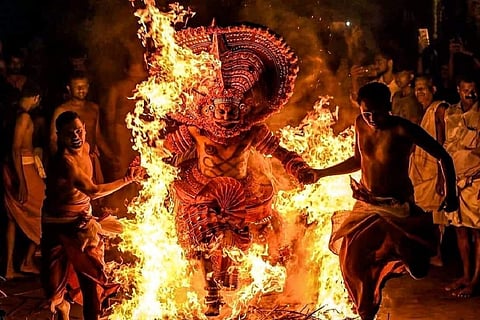

After protests mounted against the performance of a 14-year-old boy who donned the role of Theechamundi, the Kerala State Commission for Protection of Child Rights (KSCPCR) suo moto registered a case in the matter. Theechamundi, also called Ottakolam Theyyam, requires the performer to fall into fire. Since Friday, April 7, photos of the boy in Theechamundi costume, exhausted after the ritual, have taken the rounds on social media, inviting criticism from many. The boy, a class 8 student, belongs to the Malayan community of traditional Theyyam performers. The case was registered against the Theyyam committee convenor Suresh Varma and the child’s father, Murali Panicker.
Theyyam is a ritual dance form popular in north Kerala, in which the artists are considered to possess godly powers. In Theechamundi Theyyam, the performer will be covered in coconut fronds. During the performance, they have to run into a burning pile of wood. The artists usually sustain burn injuries and take up to weeks to heal. The Malayan community uses traditional medicines to heal the burn injuries. As per reports, the boy received burn injuries.
“Those who burn young boys in the fire should be punished. Shouldn't there be a minimum age limit for burning one's own children in the fire for material gains?” E Unnikrishnan, a renowned environmentalist from Kasaragod, posted on Facebook.
“Ottakolam must fall on a coal pile at least 108 times. There will be a shield made of young coconut and banana leaves to prevent the performer from burning. Through it, big chunks of coals will fall on the body. It is neither ritual nor art. In ancient Rome, spectators used to get the same frenzied joy when the blood of slaves, nicknamed gladiators, splattered in the air. It is their inner cruelty that burns like coal, and a 14-year-old is dragged into it. Either this atrocity should be banned or the fire should be performed only as a ritual. Those who possess humanity in north Malabar should take the initiative for that,” Rameshan P, another Facebook user posted.
Many others have also strongly condemned the practice.